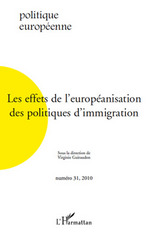Europe in electoral campaign : a cross-national analysis of the media

By means of a analysis of newspapers from ten countries, this article analyzes the nature of electoral campaigns for the June 2009 European Election. It assesses the "second-order" character of these campaigns and the degree of Europeanization of the national public spheres. We demonstrate that, even though these campaigns remained dominated by national actors and themes, 'Europe' was not completely absent. However, the Europeanization of public spheres remains limited : our analysis reveals that few references were made about EU issues and about other Member states, that the supranational actors were hardly involved and that the campaigns lacked substantive debates.
Related centers and programs
Discover our other research centers and programsFind out more
Discover all our analysesBundeswehr: From Zeitenwende (historic turning point) to Epochenbruch (epochal shift)
The Zeitenwende (historic turning point) announced by Olaf Scholz on February 27, 2022, is shifting into high gear. Financially supported by the March 2025 reform of Germany’s “debt break” and backed by a broad political and societal consensus to strengthen and modernize the Bundeswehr, Germany's military capabilities are set to rapidly increase over the coming years. Expected to assume a central role in the defense of the European continent in the context of changing transatlantic relations, Berlin’s military-political position on the continent is being radically transformed.
Merz’ European Policy-making: The End of the ‘German Vote’?
Friedrich Merz’s European ambition is to turn Germany, long seen as hesitant into a leading actor within the European Union (EU). To that end, he has pledged to end the “German vote,” a phenomenon that epitomizes the paradox of a country both indispensable and frequently absent from European decision-making.

Securing critical raw material (CRM) value chains – a prerequisite for Europe’s technological resilience
At the heart of economic security, technological resilience is a backbone of the European Union’s (EU) competitiveness. The EU’s energy and digital transitions depend on critical raw materials (CRM).

Reconciling competitiveness and demographic change: a Franco-German imperative
France and Germany are facing parallel demographic shifts that could reshape the future of their economies and their social models. These shifts reflect broader European patterns but are magnified by the central role both nations play in EU governance and competitiveness.









